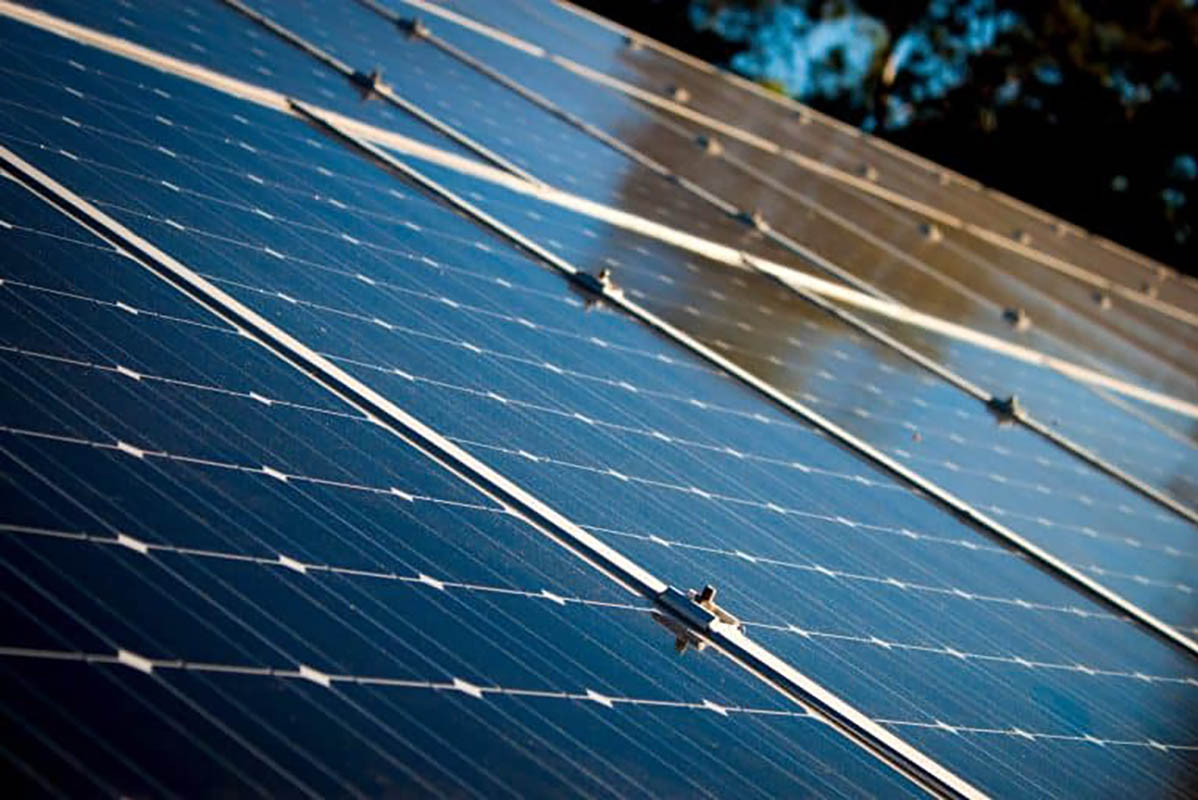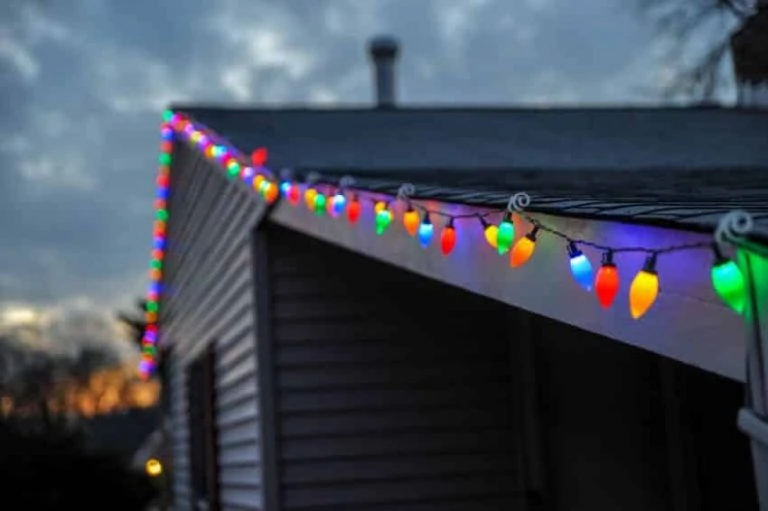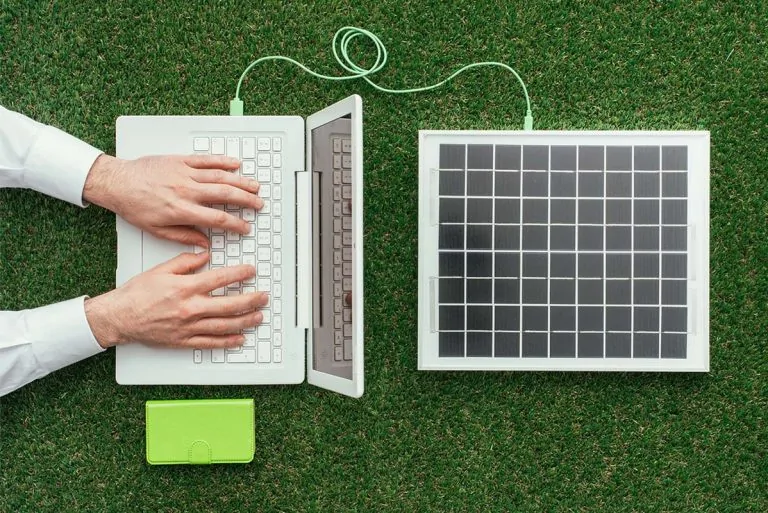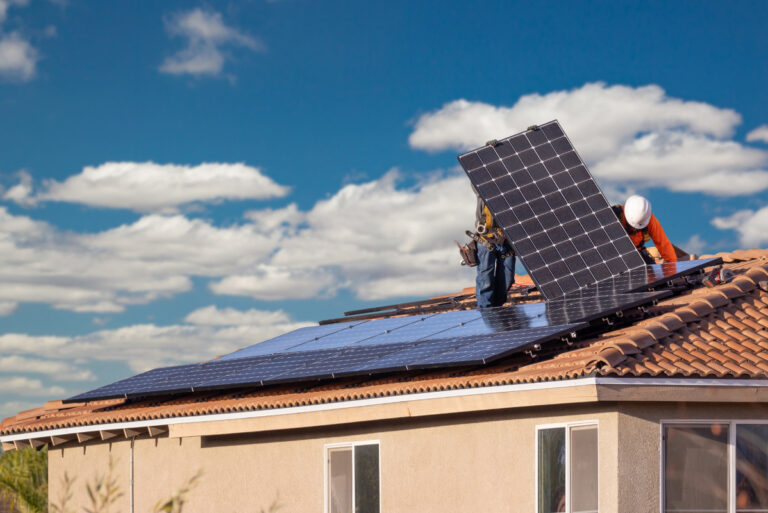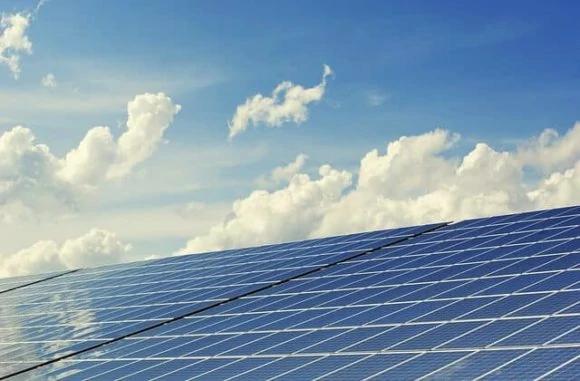Solar panels can save you thousands over time, but they come at an upfront cost. We dive into the best solar panels to buy along with reviews and an in-depth buyer’s guide.
If you’re in a rush we think the Renogy 100W 12V Eclipse solar panel is the best option for most people looking to build their own DIY solar system.
Read on to learn why as well as our other recommendations for the best solar panel for different uses.
Made from super efficient monocrystalline panels the Renogy Eclipse is a durable panel and an excellent choice for setting up your own solar system.
5 Best Solar Panels to Buy for Your Home
Let’s get into the best solar panels that you should use. These are some of our top picks for you to buy as a residential customer. This table provides the best buying options for either home mounting or taking solar panels on the go.
1. Renogy 100 Watts 12 Volts Monocrystalline Solar Panel – Best Overall
This particular solar panel is one of the most popular products launched by Renogy.
Despite its sleek design, it provides optimum power to run your off-grid applications. Renogy offers a great solar panel for your home, outdoor or boating.
You can also use it with your RV while camping. Its monocrystalline solar cells ensure maximum output and ideal efficiency.
Although it is a viable option for charging your 12-volt battery, you can also attach multiple panels to create an off-grid energy system.
With pre-installed diodes in the junction box, installing this panel is extremely easy.
Read more about Renogy in our review.
Features
- Compatible with off-grid and on-grid inverters
- 500 watt-hours/day output
- 25-year power output and 5 years material/workmanship warranty
- Anticorrosion aluminum frame
- Supports Maximum System Voltage up to 600V DC (UL)
2. HQST 100 Watt 12 Volt Polycrystalline Solar Panel – Runner Up
HQST 100 Watt 12V Polycrystalline Solar Panel is one of the high-performance solar panels for your home. This solar panel is an ideal option for your off-grid energy needs. Its enhanced stiffness offers ultimate protection against impact.
The high transparency/anti-reflective glass and bypass diodes ensure top-notch performance even in a low-light environment.
Due to its lightweight construction, you can easily install this solar panel on your roof.
Each panel contains 36 polycrystalline solar cells for efficient performance. The waterproof junction box is mounted on the back and is easy to access.
The MC4 leads make it easy to connect this solar panel with the battery. You can either use a single panel or add more panels to power up your entire home.
Its multilayered sheet laminations and advanced encapsulation material provides required protection and improves cell performance.
The aluminum frame (corrosion-resistant) is ideal for extended outdoor use, enhancing the overall lifespan of a solar panel.
Features
- Highly durable and lightweight (16.5lbs)
- Capable of withstanding snow loads (up to 5400 Pa) and high winds (up to 2400 Pa)
- Pre-drilled holes for fast mounting
- The high module conversion efficiency
- The product comes with 5 years workmanship and material warranty. It also offers 25 years power output warranty.
3. Loom Solar Panel 50 watt – 12 Volt Mono crystalline
Loom Solar 50-watt solar panel is made of A-grade mono perk cells and ultra clear tempered glass which gives 22% higher energy efficiency and also performs better in low light and cloudy weather.
The solar panel is designed to handle a variety of weather conditions for solar, which enhances the overall reliability of the production and ultimately, the efficiency.
The Loom Solar Panel is the latest panel in monocrystalline technology that comes with 4 busbars, 36 cells and 25 years performance warranty. IP 67 rated junction with MC4 connectors and 1-meter wire is given for outdoor use.
This solar panel is the ultimate upcoming product in solar technology.
Features
- Enhanced performance warranty
- Aesthetic roof
- Great durability
- Excellent performance in low-light conditions
- Great efficiency and reliability
4. WindyNation 100W Solar Panel
With Windy Nation 100 Watt Solar Panel, you can produce free power for your home for an extended period. Besides, this panel works perfectly as backup power and can be utilized to generate power for your boats, RV’s or cabins. It allows you to increase the amps to charge your 12V battery when two or more panels are wired in parallel.
Moreover, to charge a 24V or 48V battery, just connect more than one panel in series. WindyNation offers the best solar panels that are ready to use and easy to install.
Features
- Grade A solar cells
- Durable and Heavy-duty anodized aluminum frame
- 25-year power and 5-year parts/labor warranty
- Provides 300-600 Watt Hours of power per day
- High Energy Conversion
5. Newpowa Monocrystalline 100W 12V Solar Panel
Newpowa is a renowned name when it comes to the manufacturing of high-performance solar panels. The Newpowa 100 Watt Monocrystalline 12V Solar Panel is highly efficient and offers unmatched durability.
The solar cells are enclosed in EVA (ethylene-vinyl acetate). It is covered with tempered glass (high transparent low iron) and protected with durable TPT (Tedlar-polyester-Tedlar) back sheet.
These are the high-performance solar panels, capable of performing in a low-light environment.
Features
- Ensures optimum performance in all weather conditions
- Simple installation procedure
- Durable construction
- Anticorrosion aluminum frame for desired strength and rigidity
- Comes with pre-attached 3ft MC4 Cables
- 25-year power output warranty
Best Solar Panels to Buy for Commercial Scale
In considering the top solar panels to buy for a commercial business, you’ll likely need a bit more scale than residential use. These solar panels are a bit more expensive but have higher efficiency and output.
1. SunPower Solar Panels
SunPower has been one of the best in breed solar panel manufacturers out there for the last decade. The Company has a rich history in solar panel manufacturing, and many consider them to be a leader in the solar industry.
SunPower designs, manufactures, and delivers a wide range of high-performance solar electric systems across the country for commercial, residential purposes.
The company started production of the high-performance interdigitated back-contact cells (IBC) in 2007. Since then, they are using this most efficient cell technology of the current time.
SunPower’s panels are much more efficient than the competition from 16.5% to 22.8%. SunPower’s basic solar panel comes with a 25-year warranty against any defects. You can read more about the company in our SunPower solar review.
2. LG Solar Panels
LG is one of the top electronics manufacturers and it’s only fitting that they would be one of the best solar panel providers for commercial use. LG also offers an Energy Storage System (ESS), which is a battery energy storage system that helps store and manage the dispatching of power.
LG Solar performs at the top end of the competition with a 17.4% to 21.7% panel efficiency rating. Like SunPower, you will also retain a quality 25-year warrant for performance and any defects.
3. Panasonic Solar
Next up is another brand that you’ve likely seen before. Panasonic is a high-quality electronics manufacturer that also produces top solar panels for your business needs. The Company pairs with local installers to ensure that you can get the right installation done for the right price.
With Panasonic Solar, you likely won’t be able to match the same efficiency as SunPower or LG, but you can obtain these panels for a better price.
This might help your payback if you don’t have to pay up for just as efficient solar. The efficiency of these solar panels is in the range of 16.1% to 20.3%.
In terms of the warranty, Panasonic offers a 25-year product workmanship warranty that guarantees 90.8% power production.
Why You Should Consider Going Solar
Basking in the sun can soothe your body and mind. However, you can also utilize sunlight in other ways that are more productive. Generating power by using solar panels is surely the best utilization of the surplus amount of sunlight.
By doing so, you can minimize your energy bills and get free energy for an extended period. In addition, solar panels can generate power with 0% carbon emissions. Hence, you can play your role to protect the environment.
Not only this, solar panels can add value to your home by making it an energy-efficient and environment-friendly place to live.
However, you need to buy only the best solar panels for this purpose. It’s easy to order solar online.
Solar energy’s popularity is higher than ever before. With the climate crisis knocking on our doors, more and more countries, industries, and people, in general, are shifting towards solar power. But do you know how solar power works? You can understand the benefits of solar power even better when you fully understand how it works.
Today you can see solar panels powering houses, shops, offices, schools, and several industries. In the US, solar installations surpassed 2 million in 2019, according to the Solar Energy Industries Association. Not only does it cut energy costs, but it is also responsible for reducing carbon emissions and creating new jobs.
Yes, the solar panels can be expensive (although prices are still decreasing), but the long-term health and environment benefits are worth it.
It’s important to note that solar panels are just part of the equation. Check out our DIY Solar Ultimate Guide for a complete background of what is requried to setup your solar system.
How Solar Panels Work
Solar panels produce solar energy. These panels produce electricity through the photovoltaic effect. The photons of the sunlight knock off the electrons from the atoms, essentially creating electric flow. In other words, the panels convert light energy into electrical energy.
The panels are made of semiconducting material, which is generally silicon. This material is the element that produces electric charges. To learn more about how solar panels are produced, check out our dedicated post on the topic.
Now, this electricity is Direct Current (DC). It has to be converted into an AC Current that the electrical appliances in your home use. This is achieved through an inverter or micro-inverter depending on the size of the solar energy system in your home.
At homes, the inverter ensures that solar power is primarily used and only when it is not available, the electricity from the grid is used.
You do not have to switch anything on or off. The solar panel system works seamlessly. You may have to change the angles of the solar panels, depending on your location or time of the year.
Types of Solar Panel Technology
To understand how solar panels work, you need to know the different types of solar panels and their construction.
There are essentially three types of solar panels, and each has different construction, performance, installation, and cost. This gives each of them their unique advantages.
1. Monocrystalline
Monocrystalline panels are made of silicon wafers. These silicon wafers are stacked to create a rectangular shape of the panels.
The difference is in the composition of silicon.
Monocrystalline silicon wafers are cut from a single and pure crystal of silicon.
These have black cells.
The blackish appearance is because of the reaction of light with the pure silicon in the panels.
The back sheets and frames may not be black. The sheet can be black, white, or silver, whereas the frame is commonly silver or white.
2. Polycrystalline
Polycrystalline is a mix of different silicon crystals that have been melted together.
These rectangular panels are covered by glass sheets. Polycrystalline panels are less expensive than monocrystalline panels.
However, they are also less efficient than their monocrystalline counterparts.
These have a blueish shade as a result of the mixture of silicon crystals reacting with the sunlight. The light reacts differently with this mixed composition as compared with pure silicon crystals.
The back sheets and frames have similar colors to those found in monocrystalline panels.
3. Thin-Film
Thin-film panels are made of a variety of materials. The most commonly used material is cadmium telluride (CdTe). Other materials include amorphous silicon (a-Si) and Copper Indium Gallium Selenide (CIGS).
The CdTe lies between transparent conducting layers. There is another glass layer on top for protection. The a-Si panels are similar to monocrystalline and polycrystalline panels. However, they are not solid silicon wafers. The silicon is actually non-crystalized silicon placed on top of glass or plastic.
Lastly, the CIGS thin-film panel has the materials sandwiched between two conducting layers.
It has electrodes on the outside to capture the power. Thin-film panels are not as efficient as monocrystalline either.
However, they are the lightest. The best solar panels for your house depends on your budget, system, and needs. You commonly see thin-film solar panels as flexible solar panels.
As their name suggests, these panels are very thin. The cells are, on average, 350 times sleeker than the crystalline cells.
However, thin-film panels overall look similar to monocrystalline and polycrystalline panels.
This is because of the thick frame of the panel. Nevertheless, these lie very close to the roof.
Things to Consider in Finding the Best Solar Panel to Buy
Buying a solar panel is a tricky thing unless you have the required technical knowledge. Hence, you need to do your homework by gathering as much information as you can by talking to professionals and experts.
Since it is a substantial investment, make sure to consider all the essential aspects of your purchase. With a view to buying the best solar panels, try to compare their efficiency, price, durability, and compatibility.
Although a wide range of companies offers their solar panels for sale, you need to choose one that meets your needs.
While buying solar panels for your home, you must keep these important factors in mind.
What type of panels do you need?
Before buying solar panels, make sure to carry out a survey regarding what type of panels you can mount on your roof. If you have less space, try installing highly efficient monocrystalline solar panels.
Moreover, also keep in mind the overall number of panels required and the cost of installation. Determine if you need solar racking on your roof or not.
A consideration, if you want to try solar out before moving to a larger scale system, is by using flexible solar panels for small mobile applications like TVs, appliances and mobile devices.
Manufacturer’s warranty
As a consumer, it is your right to know what type of warranty you get. Hence, ask about the manufacturer’s warranty when buying solar panels and solar panel kit packages.
If the warranty is of substantial nature (at least 25 years), it means that the product is reliable.
You’ll want to make sure that your warranty covers the majority of the lifespan. The lifespan of solar panels is generally 30 to 35 years. Some technologies allow for up to 40 years of a lifespan. Here is a guide on how long solar panels last.
Consider if you need a solar installer to get the solar project up and running on your home.
Compare the price
By comparing the price of solar panels, you can actually get an idea about the quality of a product. Usually, low-quality products are cheaper than high-quality products.
Hence, don’t fall prey to the marketing tactics of unreliable manufacturers.
Read more about how to use the solar payback calculator and get started.
Solar panel certifications
Only certified solar panels can meet the advertised specifications. Look for the certifications awarded to the product that you want to buy. It will allow you to assess the efficiency and performance level of a solar panel. Make sure that the solar panels are tested by an independent laboratory.
What Impacts the Performance of a Solar Panel?
Now that you know how the solar panels produce power, it is equally important to understand what factors affect their performance.
Generally speaking, the efficiency of solar panels (also known as a capacity factor) ranges from 14% to 18%. This is a great way to determine the efficiency of a solar panel. Some of the high-performance solar panels perform above the 18% efficiency mark but usually end up costing more.
That is enough for the panels to produce ample power for the size of the solar panel system on your roof.
Here is what impacts their performance:
Orientation
The orientation of the solar panels indicates the angle they are tilted at from the ground up. This angle directly affects their efficiency as they directly face the sun. The orientation varies by hemisphere, region, and even your city or town.
For maximized efficiency, you may need to change orientation at least twice a year according to the weather. There are tracking systems to do this automatically.
However, for domestic solar panel systems, they may not be cost-efficient. Consider these solar panel angles to determine optimal positioning for your location.
Shade
Another factor, rather a problem, affecting solar panel performance is shade. The whole point of installing panels is to expose them to the sunlight so they can produce energy. Shade blocks sunlight and reduces the output.
A little bit of shade on a single panel may have a domino effect on all others in the system.
The best way to ensure there is no shade on the panels is to place them at a decent distance.
This can be tricky if you have limited roof space. Just make sure there is no shade at peak hours. which is during midday.
Temperature
Temperature can also affect efficiency, although not severely. Solar panels do not work great at very high temperatures. With higher temperatures, the conductivity increases which makes the overall voltage lower.

One way to deal with this issue is to allow ample air circulation around the panels.
Alternately, you can opt for panels that are better adept at withstanding high temperatures.
Useful Tips to Help You Buy Solar Panels
Since solar panels last a lifetime, you might think it should be easy to buy them without much decision making. However, you can get the bang for your buck if you keep in mind these helpful tips:
- Look out for manufacturer warranties as they can help estimate their life. A warranty of 25 years or longer indicates the solar panels are high-quality.
- Solar panels should have appropriate certification. Not only does it ensure that they have standardized performance but may even earn you tax rebates.
- Consider the area you have for the solar panel system. If you have limited space, you might want to invest in the most efficient solar panels like monocrystalline ones.
- Pay attention to the inverter as it can make or break the output of the solar panels. If it is not efficient enough, your solar panels’ true output may not be materialized. These are some of the best solar inverters you should consider.
- Lastly, compare prices, especially when making a major purchase. Solar panel companies can even give you quotes with all the details that you can use to find the best deal.
Understanding how solar power works can help you pick out the best solar panels.
There are myriads of benefits of investing in solar energy, even if you are doing it on a very small scale. In just enough time, the investment will pay for itself.
All the while you’ve done your part in moving to a more sustainable resource for power.
In order to limit your search, we have compiled a list of top solar panels. So choose the most suitable solar panels to get maximum benefit through your solar power system.
If you have more questions about solar energy, download our solar energy questions and answers PDF guide.
Things to Consider Before Installing a Solar Panel
Using solar panels on a commercial and residential level is a great example of harnessing renewable energy resources. It is an efficient, cost-effective, and environment-friendly way to generate power.
The installation of solar panels requires due care and caution to improve their efficiency.
However, before installing solar panels on your roof or any other place around your home, you need to pay attention to the following factors.
1. How many benefits you can get
Before installing solar panels, make sure to assign a specific place on the roof for installation. This is will increase the efficiency of your solar power system by providing the maximum amount of sunlight.
In addition, analyze the parameters for installation such as roof size, orientation, and amount of power your home needs.
Install solar panels away from tree shades to avoid sunlight restriction and accumulation of debris.
2. Installation Cost
To calculate the installation cost, you need to consult the solar panel technicians. They will guide you regarding the actual number of solar panels required for the setup.
In addition, you can ask for a recommendation as to what type of solar panels can perform well in the given conditions. If you are looking to put solar on your roof, you’ll need to calculate the load. If solar is going on your land, you’ll need to understand how much land is required for solar.
These are important decisions as it influences the install cost and ultimately, the financial benefits you receive from installing solar.
Keep in mind where you install your panels. You’ll likely need to clean them or hire a service to clean them. Read more about how to clean your solar panels safely and effectively.
3. Calculate the Consumption Rate
Make sure to calculate the overall consumption rate to analyze how much energy your home consumes. For less consumption, a small solar system will serve the purpose.
You can save a lot in terms of installation cost if you know how much panels are needed to power up your home.
4. Types of Solar Panel
When buying or installing solar panels for your home, make sure you are using the right type of panels in terms of efficiency and cost.
Monocrystalline panels, for instance, are highly efficient. This might have an impact on how you’d want to install the solar panels.
On the other hand, they are relatively more expensive than polycrystalline. You need to examine each of these options depending on requirements.
This will allow you to install the top-quality solar panels for optimum efficiency while minimizing the overall installation cost.
Here is a full comparison of monocrystalline vs polycrystalline solar panels.
Alternatively, some people have been moving to bifacial solar panels to help get sunlight on both sides of the panels.
Other Solar Panel Resources
We have provided you with a number of other resources to help you understand the needs of your solar panels.
- Best Batteries for Solar Panels
- How to Clean Your Solar Panels
- How to Test a Solar Panel for Production
- Solar Power Production Guide
- A Case Study of How Solar Panels Perform in Weather Conditions
Conclusion on Best Solar Panels to Buy
With so much information available, it is now much easier for you to make a perfect decision while buying solar panels for your home. All these solar panels are capable of meeting your specific energy needs.
The idea of harnessing renewable energy is great and it is beneficial for you in many ways.
However, make sure to purchase and install the right type of solar panels to meet all your energy-related needs. Don’t make a decision in a haste.
Try to consult professionals to find out about the currently available solar panels for sale that are highly efficient and reasonably priced.
If you have made up your mind to buy one of these solar panels, just go ahead and purchase the most suitable option. To know how to buy solar panels online, just follow us on social media.
What do you think of the best solar panels? Please let me know in the comments below.

